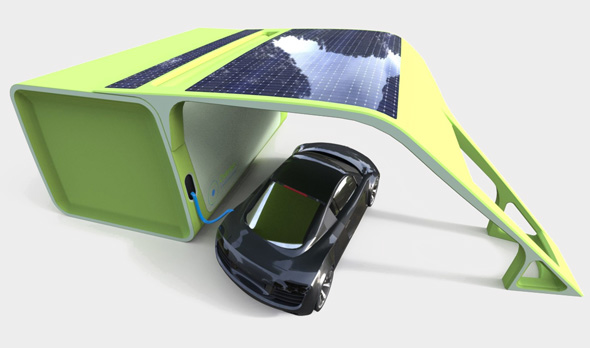Using Flywheel Batteries to Charge Electric Vehicles in Ten Minutes
Chakratec Ltd., an Israel-based battery startup, raises $4.4 million as it tackles some of the last obstacles holding back electric cars
12:5614.05.18
Even as electric vehicles appear to be on the verge of going mainstream, there are at least two major roadblocks holding back the technology. One is the lack of charging infrastructure outside of cities, which makes long-distance travel impossible, or at least nerve-wracking. Another significant inconvenience is the amount of time is takes, sometimes hours, to charge electric vehicles.
 Chakratec's concept for an electric vehicle charging station. Photo: PR In places where grid capacity is limited, flywheel batteries can be deployed to provide the powerful surge of electricity needed to recharge a car battery quickly. The current produced is strong enough to charge a battery in ten minutes, according to a promotional video by the startup.
Chakratec's concept for an electric vehicle charging station. Photo: PR In places where grid capacity is limited, flywheel batteries can be deployed to provide the powerful surge of electricity needed to recharge a car battery quickly. The current produced is strong enough to charge a battery in ten minutes, according to a promotional video by the startup.
For daily updates, subscribe to our newsletter by clicking here.
An Israel-based startup called Chakratec Ltd. is trying to solve both problems by developing what it calls a kinetic battery device, which stores energy using a flywheel instead of relying on chemical compounds like in lithium-ion batteries.
 Chakratec's concept for an electric vehicle charging station. Photo: PR
Chakratec's concept for an electric vehicle charging station. Photo: PR With this technology, Chakratec hopes to make electric vehicle charging stations commerically viable in rural areas—that is, cheaper to build and operate where upgrading the grid for fast electric vehicle charging can be prohibitively expensive.
A $4.4-million funding round announced Sunday will help the startup test its energy storage system as part of three pilots with European electric utilities.
The investment round, which was led by iArgento, an Israel-based family office, and Goldbell Corporation Pte Ltd., a Singapore-based distributor of industrial vehicles, brings Chakratec’s total equity funding to $7.6 million since its founding in 2013.
Related stories:
- The Case for Electric Scooters
- Mobileye to Expand Self-Driving Car Tests to California and Arizona
- Regulus Cyber, which Protects Autonomous Cars and Drones, Raises $6.3 Million
The startup says that its batteries can provide unlimited charging and discharging cycles per day for a 20-year lifetime, a significant advantage over conventional energy storage.



